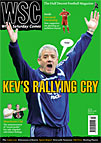 Joyce Woolridge examines the events and publications marking the 50th anniversary of the tragic incident
Joyce Woolridge examines the events and publications marking the 50th anniversary of the tragic incident
As the 50th anniversary of the 1958 plane crash that killed 23 people, including eight Manchester United footballers, approached, the club announced that there would be a new memorial “both significant and easily accessible to all who visit the ground”. This deceptively bland statement nevertheless revealed the club’s anxiety to avoid potential controversy. Why the commemoration of the tragedy should be so fraught with difficulty lies partly in the past, in the continuing dispute about the ways in which victims of the crash were and still are treated. Also, Man Utd’s recent ownership history has left the club, in the eyes of its critics, unworthy to “own” or exploit the disaster’s memory commercially.
Three new books each offer a different approach to remembering the crash. David Hall was 12 in 1958, and his Manchester’s Finest (Bantam Press) is a first-person narrative from the perspective of a schoolboy in Wythenshawe who witnessed the impact upon the people of Manchester. Life in late-Fifties Manchester is acutely observed, providing the context for appreciating the depth and extraordinary nature of the reaction. Occasionally the approach becomes irritating and distracting, but it is for the most part highly effective.
Stephen Morrin is an aviation historian and his version of events, The Munich Air Disaster (Gill & Macmillan), is centred around the pilot, Captain James Thain, whom he argues was wrongly accused of causing the crash by failing to have the aeroplane’s wing swept free of ice. The book is not only a convincing, and surprisingly riveting, technical defence of Thain, but gives a good account of the rise of the Busby Babes. It adopts the polemical slant of Jeff Connor’s The Lost Babes, which highlighted the suffering of the families of those who died or were injured and denounced the inadequate support and compensation they received.
Bill Foulkes’s unassuming memoir, United in Triumph and Tragedy (Know the Score), is that of a survivor. Although standards for dealing with victims of traumatic accidents were very different in 1958, it is still staggering to read how Foulkes and Harry Gregg walked out of the hospital to cope by themselves in a German hotel room, and how, 13 days later, Foulkes was leading a makeshift team out on to the pitch to face Sheffield Wednesday in the FA Cup.
These accounts leave us in no doubt of what Munich meant then. The deaths were portrayed as a tragedy for Manchester and also mourned across the country. Since then, they have come to symbolise, for many Man Utd supporters at least, the loss of a golden generation and the end of an age of innocence. Three small memorials were erected at Old Trafford; two are now sub-standard replicas of the originals. Low-key yearly ceremonies have marked the anniversary, with a minute’s silence at the nearest home game.
The late 1980s revival of interest in public commemoration in general and football’s own assertion of its status have led to frequent displays of respect in memory of both football people and “outsiders”. It would be inconceivable in this climate for Man Utd not to make special efforts to mark the 50th anniversary. Indeed, there have been increasing complaints since the 1990s that such official remembrance has been inadequate, and alternative ceremonies have been staged by fans. The club’s publicised intentions, namely to rename the South Stand tunnel the “Munich Tunnel”, housing a “free, permanent exhibition telling the story of the Busby Babes” and the wearing of a logo-free one-off 1950s-style kit which will not be sold as a replica, had met with general approval, designed to forestall any allegations of tawdry commercial exploitation.
However, the unveiling of a giant photograph, along with a verse from the “United Calypso” (unfortunately with a word missing), has been met with ferocious protests because it carries the prominent logo of club sponsors AIG. The commemorations have to some extent become the focus of a struggle for ownership of the “soul” of Man Utd.
What the Munich Crash now represents for supporters of other teams is not easy to gauge. Although tribal loyalties and anti-Man Utd sentiments bulk large in British football, it is surely not naive to believe that many might have wanted the opportunity to join in some sort of tribute. So great were the fears that any silence might be sabotaged by the cohort usually described as “a few idiots” that Man City fans had to be reminded by letter that former City hero Frank Swift also died.
The FA initially felt unable even to allow that tribute for those with a short attention span, the minute’s applause, at the friendly international against Switzerland on February 6, though they have since changed their minds. Should there be even the slightest disruption, we can expect football’s detractors and the serried ranks of moral commentators in the media to seize on it gleefully.
From WSC 253 March 2008